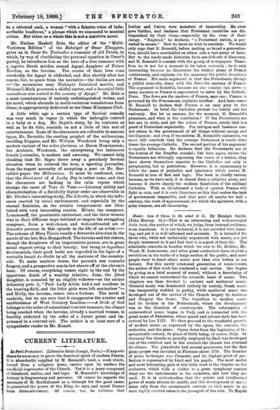CURRENT LITERATURE.
LePlril Protestant. (Librairie Saint.Joseph, Paris.)—If any evi- dence be necessary to prove the fanatical spirit of modern France, it is abundantly supplied by M. Renauld's book, a work which, issued from a religious press, carries upon its surface the unofficial imprimatur of the Church. Yet it is a sorry compound of falsehood, malice, and bad logic. M.*Renauld's knowledge of history is fragmentary and perverse. Of course he regards the massacre of St. Bartholomew as a triumph for the good cause. It preserved the power of the King, he says, and saved France from dismemberment. Of course, too, he believes that Luther and Calvin were monsters of immorality. He even goesfurther, and declares that Protestant countries are dis- tinguished by their vices,—especially by the vices of their clergy. " England," he declares, " a Protestant nation, is per- verted to excess." Now we have no wish to retaliate. We would only urge that M. Renauld, before making so broad a generalisa- tion, should have marshalled on either side a vast array of facts. But to the ready-made historian facts are difficult of discovery, and M. Renauld is content with the gossip of newspapers. There- fore, he is not for a moment to be taken seriously ; he is only interesting because be illustrates the wildest phase of French controversy, and explains (in his measure) the pitiful decadence of France. His main argument is that the Protestants, though a pitiful minority, share with the Jews the mastery of France. The argument is doubtful, because no one country can serve so many masters as France is represented to serve by the Catholic Press. The Jews are the masters of France, says one ; France is governed by the Freemasons, explains another. And here comes M. Renauld to declare that France is an easy prey to the Protestants. In brief, the Catholics protest too loudly and too variously. But let us assume, for the moment, M. Renauld's premisses, and what is the conclusion ? If the Protestants are but one in sixty, and yet the rulers of France, surely that is a proof of Protestant superiority. For intrigue and baseness can- not attain to the government of all things without energy and intelligence : and even if we endorse M. Renauld's calumnies, we must still conclude that the average Protestant is worth sixty times the average Catholic. The second portion of his argument is equally fallacious. He declares that the Protestants are at the bottom of the Dreyfus scandal; but here again, unless the Protestants are wittingly espousing the cause of a traitor, they have shown themselves superior to the Catholics not only in perspicacity, but in patriotism. However, it is unnecessary to follow the mass of prejudice and ignorance which serves 31. • Renanld in lieu of fact and logic. The book is chiefly curious because, as we have said, it is issued from a religious press, and because it shows clearly the reckless fanaticism of the militant Catholics. With so ill-informed a body of opinion France will fight in vain, and it is such literature as this that makes the task of government impossible, and that puts off, maybe for half a century, the work of appeasement, for which the agitators, with a grim humour, are all clamouring.






































 Previous page
Previous page